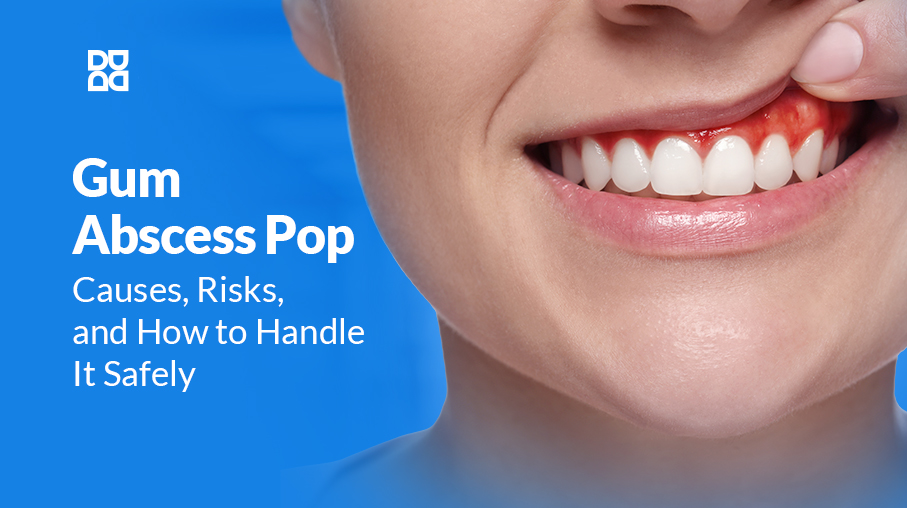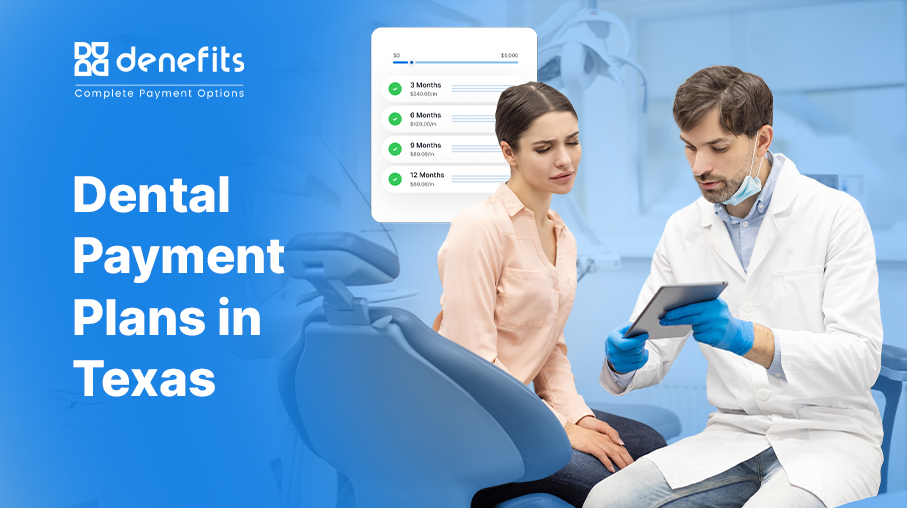
Dealing with a gum abscess pop can be more than a painful inconvenience, it can throw your entire day off track. Gum boils, those swollen, pus-filled bumps on your gums, don’t just cause discomfort; they can make simple tasks like eating, talking, or even smiling a challenge. What seems like a small issue can quickly snowball into something bigger, disrupting your daily routine and leaving you in pain. Understanding the causes and proper treatment of gum abscesses is essential to keeping your oral health and busy life on track.
What is a Gum Boil?
A gum boil is a dental abscess filled with pus, indicating an infection. It looks like a pimple or a bump that rests on your gums and appears red, swollen, and tender to the touch. Symptoms of a gum boil include:
- It Hurts to Eat or Brush: The area around a gum boil is often sensitive, making chewing or even brushing your teeth painful.
- Your Gums Look Puffy and Inflamed: The tissue around the boil usually appears swollen and irritated, making it stand out even more.
- It’s Red or White: Depending on how much pus has built up inside, the boil might look red or white.
- It Tastes (and Smells) Bad: If the boil bursts, it can leave a nasty taste in your mouth and even cause bad breath.
- There’s a Constant Ache: You could feel a throbbing or pressure in the area, even when not touching it.
Common Gum Boil Causes
Here are some common causes of a gum boil:
➡️ Bacterial Infections
The main reason gum boils form is because of bacterial infections. When bacteria from plaque or leftover food particles invade your gum tissue, they can cause an abscess to develop. This is especially common in areas where proper brushing and flossing have been neglected.
➡️ Skipping Good Oral Hygiene
Not keeping up with regular brushing and flossing allows plaque and tartar to build up, giving bacteria the perfect place to grow. Over time, this can lead to gum disease, often resulting in abscesses like gum boils.
➡️ Dental Problems That Trigger Gum Boils
- Untreated Cavities: If a cavity gets bad enough, bacteria can spread beyond the tooth and infect the gum tissue, causing a boil to form.
- Advanced Gum Disease: With severe gum disease (periodontitis), pockets can develop between your teeth and gums, trapping bacteria and leading to infections.
- Injuries to Your Gums: Whether from rough brushing, dental procedures, or ill-fitting crowns or dentures, any injury to your gums can let bacteria sneak in and cause an infection.
- Tooth Root Infections: When the pulp inside a tooth becomes infected, the infection can spread to your gums resulting in a gum boil.
Why You Shouldn’t Ignore Gum Boils
Gum boils aren’t just a minor inconvenience—they’re often a red flag for bigger dental problems. An infection usually causes these painful bumps, and ignoring them can lead to serious complications. The infection can spread beyond the gums, potentially affecting the bone supporting your teeth or other areas of your body. In severe cases, untreated gum boils can result in tooth loss or damage to surrounding tissues.
Can You Pop a Tooth Abscess?
Dealing with the pain and pressure of a tooth abscess can be frustrating, and it’s easy to see why someone might think about handling it themselves. A quick search online for how to pop a gum abscess at home might even make it seem like a simple solution.
Is Popping a Gum Abscess Safe?
Absolutely not. Trying to pop a gum abscess at home is never a safe or recommended option. While it might seem easy to get rid of the pus and relieve the pressure, it can do more harm than good. A gum abscess is a sign of a bacterial infection, and unless the root cause is addressed, the issue won’t go away—it could even get worse.
Can Popping a Gum Abscess Kill You?
No, it won’t kill you. But popping a gum abscess on your own can have serious consequences. If the infection isn’t properly treated, it could spread to other body parts, including your bloodstream, potentially causing sepsis. Sepsis is a serious medical emergency that needs immediate attention. While this is rare, it’s important to understand the risks, thus, it’s always best to leave the treatment to a professional and avoid trying to pop a gum abscess on your own.
Risks of Popping a Gum Abscess at Home
Here’s why trying to figure out how to pop a gum abscess at home is risky:
- Spreading the Infection: Popping the abscess could push bacteria deeper into your gum tissue, making the infection even worse and harder to treat.
- Not Draining It Fully: Even if some pus comes out, there’s a good chance you won’t remove all of it, leaving the infection to continue spreading.
- Increased Risk of Sepsis: If the infection isn’t properly treated, it could lead to sepsis, which can be very dangerous.
- Damaging Your Gums: Using the wrong tools or techniques to pop the abscess could harm your gum tissue, causing more pain and swelling.
- Delaying Proper Care: Attempting to manage it on your own could postpone seeking professional treatment, giving the infection more time to spread and potentially making things worse.
What To Do if a Dental Abscess Bursts on Its Own?
If a dental abscess bursts on its own, the infection has reached a serious stage. While pus release might relieve pressure and ease pain for a bit, it doesn’t mean the infection is gone.
Steps To Take if a Gum Abscess Popped by Itself
Here’s what to do if a dental abscess bursts on its own:
- Rinse Your Mouth: Gently rinse with warm salt water to clean the area and help fight bacteria.
- Spit Out the Discharge: If pus or fluid comes out, spit it out instead of swallowing it to avoid ingesting bacteria.
- Stop Any Bleeding: If there’s a little bleeding, press a clean piece of gauze or cotton on the area to help it stop.
- Ease the Pain: Take an over-the-counter painkiller like ibuprofen or acetaminophen to reduce pain and swelling.
- Stay Hydrated and Keep Your Mouth Clean: Drink plenty of water and brush your teeth gently, but avoid the area where the abscess popped.
- See a Dentist ASAP: Even if you feel better, get it checked by a dentist. They’ll clean the area, treat the infection, and take care of what caused the abscess in the first place.
- Watch for Warning Signs: If you notice a fever, chills, swelling that doesn’t go down, or trouble swallowing or breathing, get medical help immediately—these could mean the infection is spreading.
Professional Gum Boil Treatment Options
If you’re dealing with a gum boil or abscess, seeing a dentist is essential to tackle the problem at its source. Here’s how they typically treat it:
- Drainage: The first step is to drain the gum boil to remove the pus and reduce the pressure. This not only relieves pain but also helps prevent the infection from spreading.
- Antibiotics: After draining the abscess, your dentist may prescribe antibiotics to kill off any leftover bacteria and help the area heal. This is an important step to ensure the infection doesn’t come back.
- Treating the Underlying Cause: To prevent future issues, your dentist will address what caused the gum boil in the first place. This could involve treating gum disease, fixing a decayed tooth, or cleaning out a deep pocket where bacteria had built up.
How to Safely Handle a Gum Boil After a Tooth Extraction
If you notice a gum boil after tooth removal, manage it carefully without interfering with the healing process. Here are a few tips to handle it safely:
- Clean Gently: Use warm salt water to rinse your mouth and keep the area clean. This helps reduce bacteria without irritating the extraction site. Avoid strong mouthwashes that could cause further discomfort.
- Avoid Pressure: Refrain from touching, poking, or squeezing the gum boil. Doing so can spread the infection or slow down healing.
- Stick to Soft Foods: Choose soft, easy-to-eat foods to avoid irritating the affected area while it heals.
- Pay Attention to Symptoms: Keep an eye on the gum boil. If it becomes larger, more painful, or starts oozing pus, reach out to your dentist.
Importance of Consulting a Dentist for Wisdom Tooth Abscess Gum Infections
Wisdom teeth are especially vulnerable to infections because they’re hard to clean and often don’t come in properly. If you develop a gum abscess near a wisdom tooth, it can cause severe pain, swelling, and even serious complications if ignored.
Here’s why it’s so important to see a dentist:
- Accurate Diagnosis: A dentist can figure out exactly what’s causing the problem, whether it’s a partially erupted wisdom tooth, gum irritation, or something else entirely.
- Effective Treatment: Depending on the situation, they might drain the abscess, prescribe antibiotics, or recommend removing the wisdom tooth to fix the issue.
- Avoiding Serious Complications: Leaving a wisdom tooth abscess untreated can lead to infections spreading to other parts of your mouth, jaw, or neck—things you don’t want to risk.
Home Remedies and Treatments
While it's possible to manage a gum abscess at home for temporary relief, it’s crucial to understand that these methods are not a substitute for professional care. Consulting an emergency dentist is necessary for proper treatment and to address the root cause of the infection.
Gum Abscess Home Treatment Options (Until You See a Dentist)
Here are a few things you can do to ease the discomfort and manage the symptoms temporarily until you can see a dentist:
- Warm Salt Water Rinses: ClevelandClinic suggests gently rinsing your mouth with salt water to help reduce bacteria and soothe the area. Swish warm water around your mouth for 30 seconds. This can help reduce swelling and clean the affected area.
- Cold Compress: Using a cold compress on the outside of your cheek can help numb the pain and decrease swelling. Wrap some ice in a clean cloth and hold it against your face for 10-15 minutes. Repeat this as needed to manage discomfort.
- Over-the-counter Pain Relief: You can take over-the-counter pain relievers, like ibuprofen or acetaminophen, to help with pain and inflammation. Be sure to follow the dosage instructions on the label to ensure you’re taking them safely.
Home Remedies for Gum Boil in Mouth
▶️ Garlic Juice Rinse: Known for its antimicrobial properties, garlic juice can be used as a natural rinse to target bacteria in the affected area.
▶️ Clove Oil Application: Dab a little clove oil onto the gum boil for its numbing and antibacterial effects.
▶️ Tea Tree Oil: Apply diluted tea tree oil to the area (mix with a carrier oil like coconut oil) to help reduce swelling and fight bacteria.
▶️ Homemade Healing Paste: Combine the following ingredients into a paste and apply it to the gum boil for soothing relief: 1/2 teaspoon mustard oil, 1 teaspoon turmeric powder, 1/2 teaspoon Kosher salt.
Affordable Dental Care with Denefits Payment Plans
Dental abscesses can be tough on your health—and your wallet. Ignoring the problem can lead to even bigger issues, but the cost of treatment doesn’t have to hold you back. That’s where Denefits steps in with flexible payment plans that make getting the care you need easy and stress-free.
- No Credit Checks: Worried about your credit score? Don’t be. With Denefits, your financial history won’t stop you from getting approved.
- Fast Approvals: Time is critical when it comes to dental care. Denefits’ quick approval process means you can move forward with treatment immediately.
- Flexible Payment Options: Choose a plan that fits your budget and breaks the cost into manageable payments over time.
With Denefits, you can focus on feeling better instead of stressing over how to pay for your treatment. Get the care you deserve without the financial worry!
The Bottom Line
Your oral health is too important to risk with DIY remedies. If you notice a gum boil or think you might have a dental abscess, don’t wait—book an appointment with your dentist immediately. Acting quickly can save you from unnecessary pain, serious complications, and expensive treatments later on. Professional dental care isn’t just about addressing the immediate issue; it’s about protecting your overall health and ensuring a brighter, healthier future.
FAQs
1. What Should I Do if My Gum Boil Popped on Its Own?
If your gum boil pops on its own, rinse your mouth gently with warm salt water to keep it clean. But don’t stop there—make an appointment with your dentist immediately. Even though it burst, the infection is still there and needs professional care to heal properly and avoid bigger problems.
2. Can You Pop a Tooth Abscess?
Technically, you could, but it’s not a good idea. Popping a tooth abscess on your own can spread the infection and make things worse. The pus and fluid that come out can spread bacteria to other parts of your mouth, potentially causing more abscesses or complications. It’s always best to leave it to a dentist who can drain it safely and treat the infection properly.
3. How To Drain a Gum Abscess at Home?
You shouldn’t try draining a gum abscess at home—it can worsen the infection and lead to serious complications. Instead, you can rinse your mouth with warm salt water, use a cold compress to ease swelling and take over-the-counter pain relievers to manage discomfort. These are just temporary steps, though. It’s important to see a dentist to properly treat the abscess and address the underlying problem.
4. Will a Gum Boil Pop on Its Own?
Yes, a gum boil can sometimes pop once it’s fully developed. Warm salt water rinses can help keep the area clean and may promote drainage.
5. Is a Gum Boil Painful?
They are tender and can cause throbbing pain that fluctuates in severity. You may experience discomfort while brushing your teeth or consuming hot or cold beverages.
6. Can I Pop a Gum Boil?
If you rinse with salt water, the gum boil might come to a head and pop on its own. That’s fine if it does, and it may provide temporary relief until you see the dentist. Also, keep the affected area clean (rinse with salt water after it bursts, and don’t touch it.) If it doesn’t pop, your dentist will drain the abscess.



